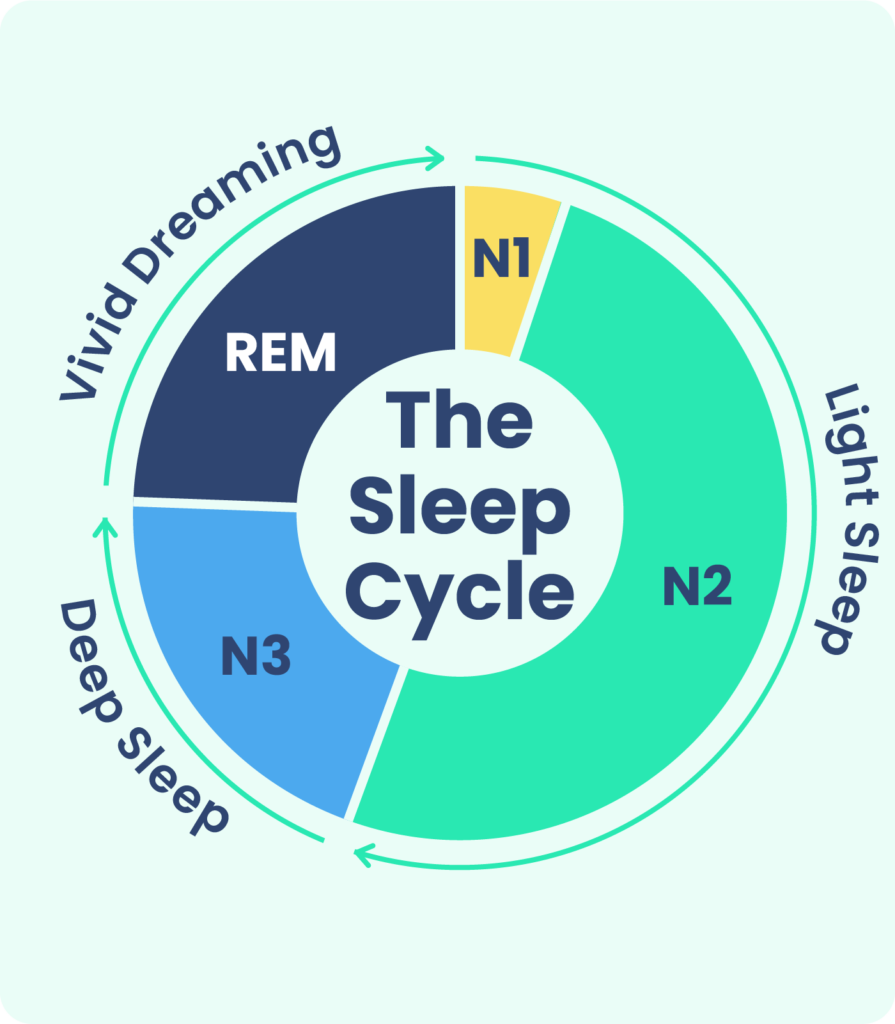Are you wondering how much deep sleep you need? Well, you’ve come to the right place! In today’s fast-paced world, where sleep often takes a backseat to our busy schedules, it’s important to understand the importance of deep sleep and how much of it our bodies require. Deep sleep, also known as slow-wave sleep, is a crucial stage of the sleep cycle that plays a vital role in our overall health and well-being. So, let’s dive in and discover just how much deep sleep you need to wake up feeling refreshed and rejuvenated.
When it comes to the amount of deep sleep you need, there isn’t a one-size-fits-all answer. The optimal amount of deep sleep can vary depending on factors such as age, lifestyle, and overall health. However, on average, adults should aim for about 1.5 to 2 hours of deep sleep per night. During this stage of sleep, your body repairs and regenerates tissues, boosts your immune system, and consolidates memories. It’s like giving your body a much-needed tune-up after a long day.
So, how can you ensure you’re getting enough deep sleep? Well, there are a few tips you can incorporate into your bedtime routine. First and foremost, create a relaxing sleep environment by keeping your bedroom cool, dark, and quiet. Avoid electronic devices before bed and establish a consistent sleep schedule. Additionally, practicing relaxation techniques such as deep breathing or meditation can help prepare your mind and body for a restful night’s sleep. Remember, quality sleep is just as important as quantity, so prioritize deep sleep and reap the numerous benefits it brings.
How Much Deep Sleep Do You Need?
In today’s fast-paced world, it’s no secret that getting enough sleep is essential for overall health and well-being. But it’s not just the quantity of sleep that matters; the quality of sleep is equally important. Deep sleep, also known as slow-wave sleep, is a crucial stage of the sleep cycle that plays a vital role in restoring and rejuvenating the body. But how much deep sleep do you really need? Let’s dive into the topic and uncover the facts.
The Importance of Deep Sleep
Deep sleep is the stage of sleep where your body can repair and regenerate itself. During this stage, your brain waves slow down, and your body relaxes, allowing for essential processes such as tissue repair, muscle growth, and hormone regulation to take place. Deep sleep is also crucial for memory consolidation and cognitive function, helping you stay sharp and focused throughout the day.
Getting enough deep sleep has numerous benefits for your overall health. It strengthens your immune system, reduces the risk of chronic diseases such as diabetes and heart disease, improves mood and mental well-being, and enhances physical performance. On the other hand, lack of deep sleep can lead to fatigue, impaired cognitive function, weakened immune system, and an increased risk of health problems.
Factors Influencing Deep Sleep
Several factors can affect the amount of deep sleep you get each night. Age is one of the primary factors, as deep sleep tends to decrease with age. Younger adults typically experience more deep sleep compared to older adults. Other factors that can influence the amount of deep sleep include:
1. Sleep disorders: Conditions like sleep apnea, insomnia, and restless leg syndrome can disrupt your sleep and reduce the amount of deep sleep you get.
2. Lifestyle habits: Poor sleep hygiene, such as irregular sleep schedules, excessive caffeine or alcohol consumption, and high-stress levels, can interfere with deep sleep.
3. Medications: Certain medications, such as antidepressants and antihistamines, can affect sleep quality and reduce the amount of deep sleep.
4. Environmental factors: Noise, light, and temperature can all impact your ability to achieve deep sleep. Creating a sleep-friendly environment can help promote better sleep.
How Much Deep Sleep Do You Need?
The amount of deep sleep needed varies from person to person. On average, adults should aim for 1.5 to 2 hours of deep sleep per night, which accounts for about 20-25% of the total sleep duration. However, it’s important to note that sleep needs can differ based on individual factors such as age, health, and lifestyle.
Infants and young children require more deep sleep compared to adults. Babies may spend up to 50% of their sleep time in deep sleep, while children typically need around 40% of their sleep to be in the deep sleep stage. As we age, the amount of deep sleep naturally decreases.
Tips for Improving Deep Sleep
If you’re looking to enhance the quality and quantity of your deep sleep, here are some tips to consider:
1. Stick to a consistent sleep schedule: Go to bed and wake up at the same time every day, even on weekends, to regulate your body’s internal clock.
2. Create a sleep-friendly environment: Make sure your bedroom is cool, dark, and quiet. Consider using earplugs, an eye mask, or a white noise machine to block out distractions.
3. Practice good sleep hygiene: Avoid caffeine and stimulating activities close to bedtime. Establish a relaxing bedtime routine to signal to your body that it’s time to wind down.
4. Exercise regularly: Engaging in regular physical activity can promote better sleep, including deep sleep. Just make sure to finish your workout at least a few hours before bedtime to allow your body to wind down.
5. Manage stress: Stress and anxiety can interfere with sleep. Find healthy ways to manage stress, such as practicing relaxation techniques or seeking support from a therapist.
In conclusion, deep sleep is a crucial stage of the sleep cycle that plays a vital role in restoring and rejuvenating the body. While the amount of deep sleep needed varies from person to person, aiming for 1.5 to 2 hours per night is a good guideline for adults. By prioritizing sleep and implementing healthy sleep habits, you can optimize your deep sleep and reap the numerous benefits it offers. So, make sleep a priority and give your body the rest it deserves.
Key Takeaways: How Much Deep Sleep Do You Need?
– On average, adults should aim for 1.5 to 2 hours of deep sleep per night.
– Teenagers need even more deep sleep, ideally around 2.5 to 3 hours.
– Deep sleep helps with memory consolidation and physical recovery.
– Quality of deep sleep is more important than quantity.
Frequently Asked Questions
When it comes to getting a good night’s sleep, deep sleep plays a crucial role in rejuvenating our bodies and minds. If you’re wondering how much deep sleep you need, we’ve got you covered. Here are some commonly asked questions about deep sleep and the answers to help you understand its importance.
1. What is deep sleep and why is it important?
Deep sleep, also known as slow-wave sleep, is a stage of sleep characterized by slow brain waves and complete relaxation of the body. It is the most restorative phase of sleep, where the body repairs and regenerates tissues, strengthens the immune system, and consolidates memories. Deep sleep is essential for physical health, cognitive function, and overall well-being.
During deep sleep, the body releases growth hormone, which helps in muscle repair and growth. It also plays a crucial role in regulating metabolism, blood pressure, and immune function. Without enough deep sleep, you may experience fatigue, decreased alertness, impaired memory, and a weakened immune system.
2. How much deep sleep do adults need?
The amount of deep sleep needed varies from person to person and depends on various factors such as age, lifestyle, and overall health. On average, adults should aim for about 1-1.5 hours of deep sleep per night, which is approximately 20-25% of the total sleep time. However, it’s important to note that as we age, the amount of deep sleep we get tends to decrease.
If you’re consistently not getting enough deep sleep, it’s worth consulting with a healthcare professional to rule out any underlying sleep disorders or lifestyle factors that may be affecting your sleep quality.
3. How can I improve the quality of my deep sleep?
There are several strategies you can try to improve the quality of your deep sleep:
– Stick to a regular sleep schedule: Go to bed and wake up at the same time every day, even on weekends.
– Create a sleep-friendly environment: Make sure your bedroom is dark, quiet, and at a comfortable temperature.
– Practice relaxation techniques: Engage in activities like meditation, deep breathing exercises, or taking a warm bath before bed to promote relaxation.
– Limit caffeine and alcohol intake: Both caffeine and alcohol can disrupt your sleep patterns, so it’s best to avoid them close to bedtime.
– Exercise regularly: Regular physical activity can improve sleep quality, including deep sleep. Just make sure to finish your workout a few hours before bedtime.
4. Can certain medications affect deep sleep?
Yes, certain medications can affect deep sleep. Some common culprits include antidepressants, beta-blockers, and medications for high blood pressure. If you suspect that your medication is interfering with your sleep, talk to your doctor. They may be able to adjust your dosage or recommend alternative medications that have a lower impact on sleep quality.
5. What are the signs of a lack of deep sleep?
Not getting enough deep sleep can result in various signs and symptoms, such as:
– Feeling tired and fatigued during the day
– Difficulty concentrating and poor memory
– Mood swings and irritability
– Weakened immune system and increased susceptibility to illnesses
– Slower physical recovery and muscle fatigue
If you’re experiencing any of these symptoms on a regular basis, it may be a sign that you’re not getting enough deep sleep. It’s important to prioritize good sleep hygiene and consider seeking professional help if the issue persists.
REM Sleep – How Much Sleep Do You Need
Final Summary: How Much Deep Sleep Do You Really Need?
After diving deep into the topic of sleep and exploring the importance of deep sleep, it’s time to answer the burning question: how much deep sleep do you really need? Well, the truth is that there isn’t a one-size-fits-all answer. The optimal amount of deep sleep can vary from person to person.
While it is generally recommended that adults aim for about 7-9 hours of sleep per night, the specific amount of deep sleep within that range can differ. On average, adults tend to spend around 20-25% of their total sleep time in the deep sleep stage. However, this percentage can fluctuate based on factors such as age, health, and individual sleep patterns.
It’s important to focus on the quality of your sleep rather than obsessing over a specific number of deep sleep hours. Prioritizing a consistent sleep schedule, creating a relaxing bedtime routine, and ensuring a comfortable sleep environment can all contribute to a better night’s rest. Remember, the key is to listen to your body and give it the rest it needs.
So, as you embark on your sleep journey, keep in mind that deep sleep is a vital component of overall sleep health. While there isn’t a magic number for the amount of deep sleep you need, cultivating healthy sleep habits and finding a balance that works for you will ultimately lead to a well-rested and rejuvenated you. Sleep tight!




